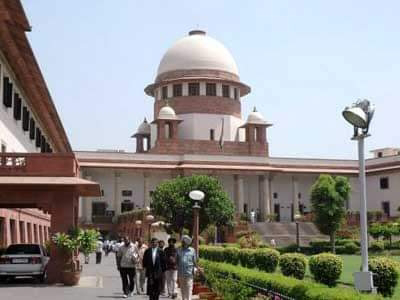In a recent decision, the Supreme Court has said that There is no evidence of cruelty and harassment for dowry demand just before death then unnatural death of wife in in-laws house within 7 years of marriage is not sufficient to hold husband guilty of dowry death. According to the case the marriage of daughter of complainant Pratap Singh with appealant/accused Charan Singh was solemnized in 1993.Married woman died under suspicious circumstances on 22 1995 within 2 years of marriage.On the complaint of the deceased's father, a case was registered against husband Charan Singh, brother-in-law Gurmeet Singh and mother-in-law Santo Kaur.In which it was said that the in-laws were murdered for not fulfilling the demand of motorcycle and land as dowry.The father of the deceased alleged that his daughter had called a day before her death and later her in-laws strangled her to death.It is also alleged that the accused had cremated the deceased without informing her parents. After the trial of the case, the trial court convicted the husband, brother-in-law and mother-in-law of the deceased for dowry death.The trial court's decision was challenged by the convicts through an appeal in the Uttarakhand High Court.The High Court had acquitted brother-in-law Gurmeet Singh and mother-in-law Santo Kaur after hearing the appeal.The High Court upheld the conviction of the husband However, the High Court reduced the sentence of 10 years rigorous imprisonment awarded to the accused husband by the trial court to 7 years rigorous imprisonment. The decision of the High Court upholding the sentence of the accused husband was challenged by the accused husband in the Supreme Court through an appeal. While hearing the appeal, a division bench of Justice Abhay S.oka and Justice Rajesh Bindal said that Dowry death case can be proved only if the cruelty and harassment for the demand of dowry in the case happened just before the death.In the present case the father of the deceased has not disclosed anything in his evidence regarding the demand of dowry just before the death of the deceased.The evidence produced by the father of the deceased regarding the demand for dowry is very old.The father of the deceased said that after 2 months of marriage, his daughter came to her maternal home and told that her husband was demanding a motorcycle.The daughter was sent back to her in-laws house, she again came back to her parents house, she again said that the husband is demanding a motorcycle and also demanding land. The bench observed that No other prosecution witness including the father of the deceased has stated about the cruelty and harassment meted out to the deceased by the husband and any other family member for the demand of dowry just before the death.The court observed that even though the parents of the deceased were not involved in the last rites, but her maternal grandmother and two maternal uncles were present, they neither informed the police nor made any allegation regarding her death. The court said that if the married woman dies unnaturally within 7 years of marriage, then in the case of dowry death under Section 304B and 498A of IPC,The court makes a presumption against the accused under section 113 B of the evidence Act.The Supreme Court considered it appropriate to examine whether in the present case a presumption can be drawn against the appellant under Section 113B of the Indian Evidence Act. The Court concluded that the evidence of the prosecution does not satisfy the pre-requisites for inference under Section 113B of the Evidence Act to convict the accused under Section 304B of the Indian Penal Code.Similarly, the elements of Section 498A of IPC are also not made out for the same reason that there is no evidence of cruelty and harassment meted out to the deceased for demanding dowry just before her death.
Tags
cruelty and harassment just before death
dowry death
dowry demand
presumption under 113 B Evidence Act
supreme Court
unnatural death
uttarakhand high court
within 7year of marriage
